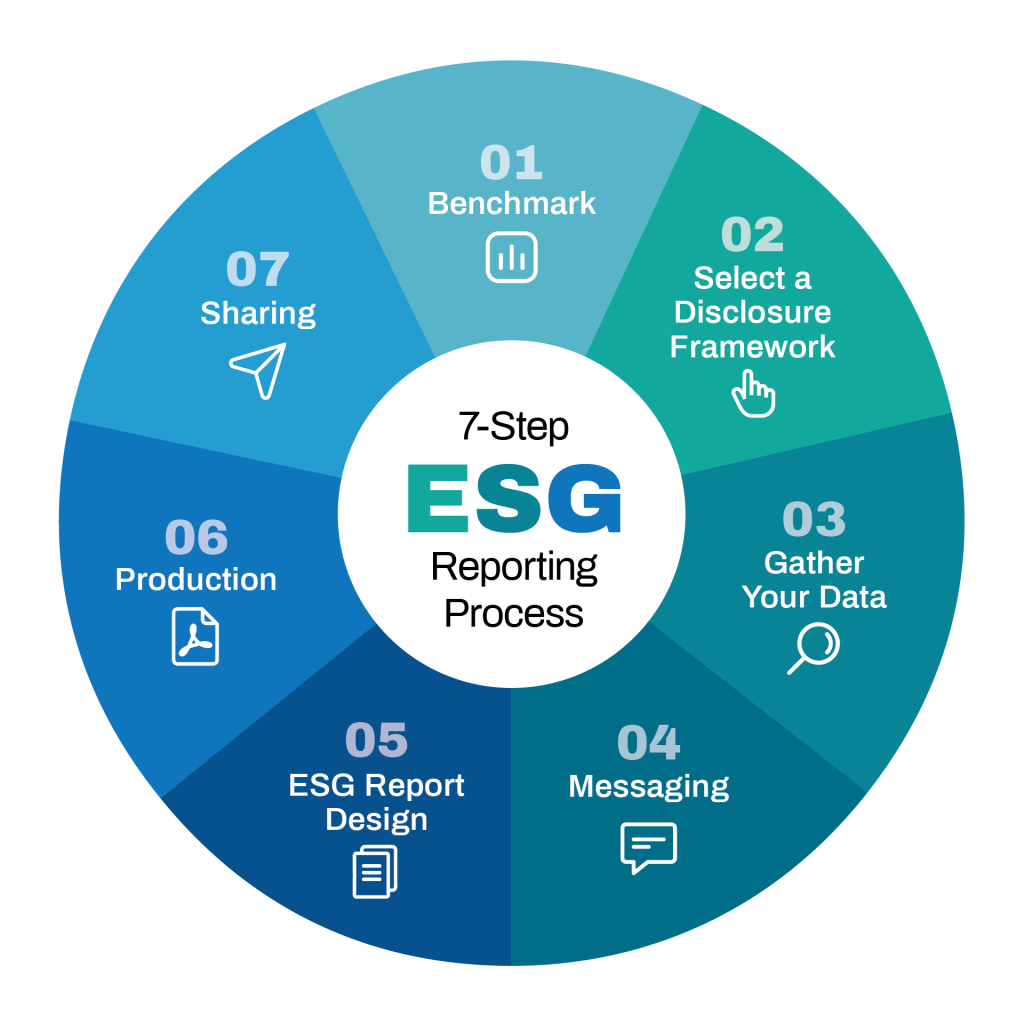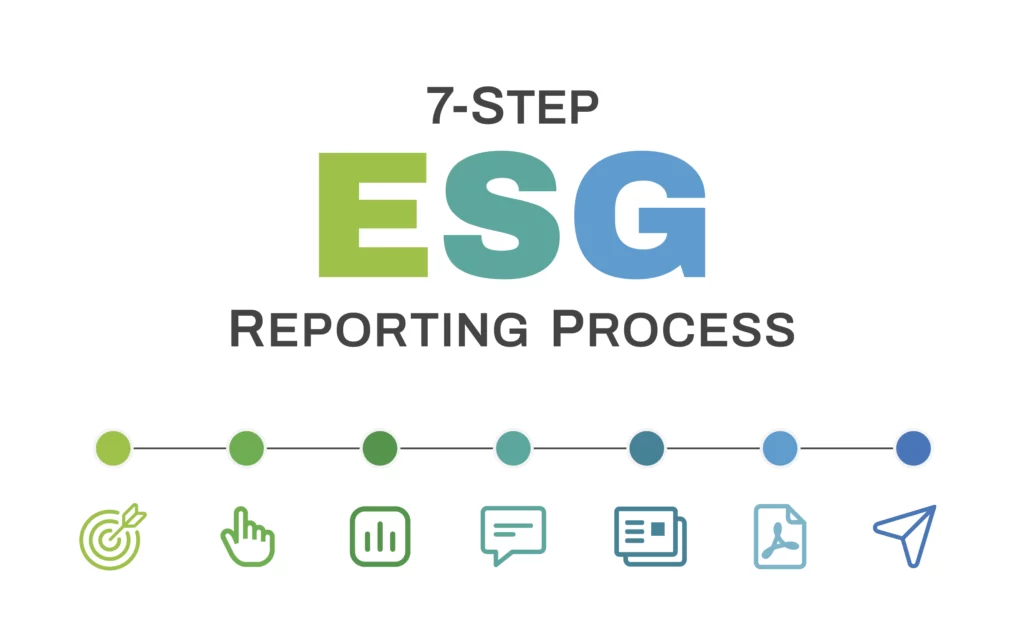ESG vs. Sustainability Reporting: Key Differences, Similarities, and Why It Matters
Sustainability & ESG, Guides / January 30, 2025
By Paul Gassett, Chief Executive Officer
While ESG and sustainability reporting are closely related, they serve different purposes. ESG reporting focuses on measurable environmental, social, and governance factors used by investors, while sustainability reporting communicates broader impact and purpose to stakeholders.
Understanding the differences and similarities between ESG and sustainability reporting helps organizations align transparency, compliance, and brand storytelling — turning data and disclosure into business value.
What’s the Difference Between ESG and Sustainability Reporting?
The terms “ESG” and “sustainability” are often used interchangeably, yet they reflect distinct perspectives. ESG reporting emphasizes how external factors affect a company’s performance and risk, while sustainability reporting focuses on how a company affects the world around it.
In short:
Snapshot View of the Differences
ESG looks at how the world impacts a company or investment.
Sustainability focuses on how a company (or investment) impacts the world.
Both frameworks are essential for companies communicating progress on environmental and social goals, but they serve different audiences and strategic purposes.
A Brief History: How ESG and Sustainability Evolved
Before we dive in, it is helpful to look at the history of the two concepts to gain the proper perspective.
1980s – EHS (Environment, Health, and Safety)
Organizations emphasized compliance and employee safety, driven by emerging environmental and occupational regulations.
1990s – The Rise of Sustainability
“Sustainability” entered mainstream business, focused on reducing environmental impacts beyond legal requirements.
2000s – CSR and Corporate Citizenship
Corporate Social Responsibility (CSR) became the dominant term, describing philanthropy, employee volunteerism, and corporate ethics.
2020 and Beyond – ESG Takes the Lead (and Faces New Scrutiny)
The term ESG emerged as a holistic, investor-oriented framework for evaluating a company’s environmental, social, and governance performance. Over the past few years, however, ESG has also become a point of public and political debate.
Some stakeholders question whether ESG delivers measurable value, while others view it as essential for managing long-term business risk and reputation. In response, many companies have shifted language toward “sustainability,” “responsible business,” or “impact reporting” — while continuing to pursue the same underlying goals of transparency, accountability, and performance improvement.
OBATA’s perspective: regardless of terminology, the objective remains the same — to help organizations communicate how they create value responsibly and credibly.
What is ESG?
ESG stands for Environmental, Social, and Governance. It represents a measurable framework for assessing a company’s ethical impact and performance.
Environmental Factors
Focus on the company’s impact on natural systems — energy use, emissions, waste management, and resource efficiency.
Social Factors
Reflect the company’s relationships with people — employees, customers, and communities — including labor practices, equity, and community engagement.
Governance Factors
Cover leadership ethics, board composition, transparency, and risk management — the structures that ensure accountability.
Companies strong in ESG performance tend to manage risk better, attract investment, and build long-term resilience.
What is Sustainability?
Sustainability is a broader concept encompassing ESG but also economic longevity and societal well-being. It focuses on meeting today’s needs without compromising future generations.
The Three Pillars of Sustainability
Environmental Sustainability — Responsible use of natural resources, carbon reduction, and biodiversity protection.
Social Sustainability — Fostering inclusive growth, education, safety, and social equity.
Economic Sustainability — Maintaining profitability and growth while minimizing environmental and social harm.
Sustainability combines data-driven metrics with vision — it’s both science and storytelling.
Key Differences Between ESG and Sustainability Reporting
While ESG and sustainability are closely related, there are some key differences between the two concepts.
Scope
ESG is a more narrow concept, focusing specifically on the environmental, social, and governance factors of a company.
Sustainability, on the other hand, is a broader concept that encompasses ESG factors but also includes economic sustainability.
Timeframe
ESG factors are typically evaluated in the present, looking at a company’s current practices and impact.
Sustainability, on the other hand, takes a longer-term view, considering the impact of a company’s actions on future generations.
Focus
ESG is primarily focused on evaluating a company’s practices and impact.
Sustainability is focused on achieving a balance between environmental, social, and economic factors.
In essence: ESG reporting is analytical and investor-driven. Sustainability reporting is strategic and narrative-driven. Together, they form a complete picture of performance and purpose.
Similarities Between ESG and Sustainability Reporting
While they differ in focus, ESG and sustainability reporting share key similarities:
- Both aim to enhance transparency and accountability.
- Both rely on standardized frameworks such as GRI and CSRD.
- Both drive continuous improvement and stakeholder trust.
- Both contribute to long-term resilience and brand credibility.
Ultimately, both approaches help businesses measure progress, manage risk, and communicate commitment to responsible growth.
Why Businesses Need to Understand Both
Both ESG and sustainability are important concepts for businesses to understand and prioritize. Here’s why.
Meet Stakeholder Expectations
Customers, employees, and investors increasingly expect companies to disclose ESG and sustainability performance. Failing to do so can erode trust and relevance.
Mitigate Risk
Assessing ESG factors helps companies avoid financial, reputational, and regulatory risks — from carbon emissions to human rights practices.
Attract Investment
Investors use ESG ratings to evaluate company performance. Businesses that demonstrate strong ESG and sustainability alignment attract capital and partnership opportunities.
Drive Innovation and Competitive Advantage
Embedding sustainability and ESG goals fosters innovation — inspiring new products, services, and processes that strengthen market leadership.Attract Investment
How to Integrate ESG and Sustainability into Business Practices
Here are some key steps businesses can take to integrate ESG and sustainability into their operations.
Conduct a Materiality Assessment
Identify which ESG and sustainability issues matter most to your stakeholders and business model.
Set Measurable Goals and Targets
Align metrics and milestones with global standards such as GRI, SASB, and the UN SDGs.
Implement Sustainable Solutions
Reduce emissions, diversify your supply chain, and embed inclusion and equity into daily operations.
Communicate and Report on Progress
Regularly publish transparent ESG and sustainability updates — integrating data with meaningful storytelling.
Revisit and Evolve
The ESG landscape changes quickly. Review frameworks, regulations, and metrics annually to maintain alignment and credibility.
OBATA: Your Partner in ESG and Sustainability Reporting
OBATA helps organizations connect ESG performance with sustainability storytelling. We provide comprehensive support for companies creating ESG, sustainability, CSR, and impact reports — guiding them through every phase of strategy, content, and design.
Our services include:
- ESG strategy and framework alignment
- Materiality assessment and stakeholder engagement
- Data visualization and storytelling design
- Report writing, layout, and publication
- Multi-channel dissemination and impact communications
Conclusion
ESG and sustainability reporting aren’t competing concepts — they’re complementary frameworks that help companies measure what matters and communicate their impact clearly.
By understanding the difference between ESG and sustainability reporting, and how they work together, organizations can strengthen transparency, meet stakeholder expectations, and turn reporting into a driver of reputation and value creation.



